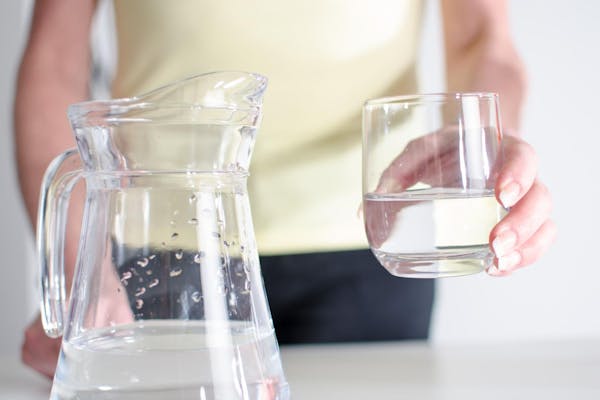May 2025
Water Pitcher FAQs: Your Water Quality Questions Answered
Key Takeaways
- Water pitchers are glass or plastic pitchers with a built-in water filter that’s often made of activated carbon or another porous material.
- Some water pitchers can remove heavy metals like lead, while others simply improve the taste and smell of your water.
- The filter life of a water pitcher can be anywhere from 40 gallons to 160 gallons, with many retailers offering replacement filter subscriptions.
Using a water pitcher to filter your tap water isn’t just good for your health — it’s usually cheaper than buying bottled water and reduces your impact on the environment. But are water pitchers effective at removing common contaminants like chlorine and lead? And how often do you need to purchase replacement filters?
Pitcher filters can improve the taste and quality of your drinking water, but it’s important to choose the right one for your water supply. Here are the answers to all of your water pitcher FAQs so you can choose the best pitcher filter or another home water filtration system that meets your needs.
What Are Water Filter Pitchers?
Water filter pitchers are typically glass or plastic water pitchers with a built-in filter that can remove impurities from your drinking water. Standard pitchers range from 7 to 12 cups, while larger water dispensers can hold up to 32 cups or more.
Since water filter pitchers aren’t connected to your water system, they’re portable and can be stored in your refrigerator, but you’ll need to refill them manually each time.
What Contaminants Do Filtered Water Pitchers Remove?
Water filter pitchers can remove some or all of the following contaminants:
- Lead
- Chlorine
- Fluoride
- Calcium
- Magnesium
- Chromium
- Pesticides
- Volatile organic compounds (VOCs)
- Per- and polyfluoroalkyl substances (PFAS)
However, it’s important to note that not all filters will remove these contaminants. Many pitcher filters only remove basic contaminants that affect the water’s taste. For lead and other major contaminants, make sure your pitcher filter has an NSF certification for the specific contaminants you want to remove. You will also want to ensure that you have visibility to a product’s performance data sheet.
If you have hard water or high levels of contaminants, you may need a more advanced water filter system, such as a reverse osmosis system or a water softener.
Are Filtered Water Pitchers Better Than Faucet Filters?
Both filtered water pitchers and faucet filters have their pros and cons, and neither one is automatically better than the other. It depends on your budget, how much water you drink, your local water quality, and other factors.
Water filter pitchers are usually cheaper and easier to set up, and you can leave them on the table, on the countertop, or in the refrigerator. But they have a limited capacity and flow rate, and you’ll need to refill them and replace the filter more often.
Installing a water filter on your faucet or under the sink takes more effort, but it may turn out to be more convenient and cost-effective in the long-run. Plus, you may have more options for water filtration technology, such as a reverse osmosis filter.

How Do I Clean a Filtered Water Pitcher?
Just because your water pitcher has a filter doesn’t mean it never gets dirty! Remember to clean your water filter regularly to prevent mold and bacteria from building up.
Some water pitchers, like the HomeWater 10 cup pitcher, are dishwasher safe, while others, like Brita, need to be washed by hand with soap and water. Check the manufacturer’s instructions or water pitcher FAQs to find out whether they recommend hand washing it or putting it in the dishwasher.
You can also rinse your filter cartridge with cold water to remove built-up sediment, but you’ll still need to replace it on a regular basis
How Much Do Replacement Filters for Water Pitchers Cost?
The cost of replacing your water pitcher filter will depend on the brand and design. Brita replacement filters start at $7.99 for a Stream Filter and $19.99 for an Elite Filter, while PUR water filters start at $10.99 for a single replacement and $24.49 for a 3-pack.
Many water filter companies offer subscriptions, so you can get replacement filters sent to you on a recurring basis for a discounted price. For example, HomeWater customers get 15% off the regular price when they sign up for an ongoing filter subscription.
Are There BPA-Free Filtered Water Pitchers?
Bisphenol A (BPA) is a toxic chemical that has been linked to several health effects, and can leach out of plastic water bottles, especially when exposed to hot water.
Some water pitchers are made with BPA-free plastic, while others are made of glass or stainless steel. Check the product description to find out if it’s BPA-free.
Can I Use a Filtered Water Pitcher with Well Water?
Whether or not you can use a pitcher filter for well water depends on what's in your well water. If you’ve tested it for bacteria and other harmful contaminants and haven’t found any, then you can use a simple water filter pitcher to improve its taste and smell.
If you need to remove lead, arsenic, or other heavy metals, you may be able to use a pitcher filter if it’s NSF-certified to remove those contaminants. But even those filters may not be certified to remove bacteria or parasites that cause diseases.
Highly contaminated well water may require more advanced water treatment, such as UV light disinfection, reverse osmosis, or ion exchange.
While you can use a pitcher on well water, we recommend that you use more advanced treatment such as a reverse osmosis system for drinking water.
Can I Put a Filtered Water Pitcher in the Fridge?
Yes, in most cases you can put a water pitcher in the fridge. In fact, it’s best to store your filter pitcher in the refrigerator or another cool, dark place, rather than in direct sunlight where mold, bacteria, and algae can grow.

How Long Does Filtered Water Stay Fresh?
Filtered water can stay fresh for several days to several weeks depending on how well it’s stored. If you store filtered water in a sealed, airtight container in the refrigerator, it can last for weeks or even months without becoming unsafe to drink.
If you’re storing water in a pitcher and removing it from the refrigerator frequently, then it’s more likely to become contaminated. Avoid leaving water in your pitcher for more than a few days; otherwise, empty it out and refill the container.
Do Filtered Water Pitchers Remove Fluoride?
Fluoride is a naturally occurring substance that’s also added to many municipal water systems as a way to prevent tooth decay. Some water pitcher filters claim to remove fluoride, but many do not; if removing fluoride from the tap water is important to you, you’ll need to look for one with an ion exchange resin. Note that even pitchers with resin in them are generally only certified for fewer than 15 gallons.
Are There Filtered Water Pitchers that Remove Lead?
Yes, there are some filtered water pitchers that are certified to remove lead. Look for one with an NSF/ANSI 53 rating, which confirms that it removes major health-related contaminants like lead, mercury, radon, asbestos, and VOCs.
If you have high levels of lead in your home, however, a water pitcher may not be as effective as a whole home filtration system. Both activated carbon filters and reverse osmosis filters can achieve an NSF/ANSI 53 rating to remove lead.
Are Alkaline Filtered Water Pitchers Worth It?
Alkaline water is water that has a pH level of 7 or higher, which is considered neutral. Some people prefer to drink alkaline water because it’s less acidic than ordinary tap water. An alkaline water filter works by adding minerals to your tap water to balance your pH without increasing water hardness.
If your water is already hard — that is, if it has high levels of minerals like calcium and magnesium — then an alkaline filter won’t make much of a difference. Otherwise, an alkaline water pitcher can be an effective way to adjust the pH of your water.
Whether or not drinking alkaline water is good for you is another matter — although it may have some health benefits for humans, it’s not recommended for pets.
How Do I Know if My Filtered Water Pitcher Is Working Properly?
The best way to find out if your filtered water pitcher is working properly is to test your tap water before and after it’s filtered. This will tell you if your water pitcher is actually removing the contaminants that it claims to remove.
Some water pitchers come with an indicator that lights up or changes color when your filter needs to be replaced. It may also have a total dissolved solids (TDS) meter that helps you monitor the mineral content of your water.
Other signs that your pitcher filter isn’t working properly include:
- Your water smells or tastes bad
- Your water pitcher is moldy or slimy
- Your water is cloudy or discolored
When in doubt, test your tap water to find out if the issue is with your local water quality or if there’s a problem with the filter itself.

What Are the Best Water Pitchers for Everyday Use?
Water pitcher filters are a convenient way to filter the water you drink every day. You can store them in the refrigerator to keep your water fresh, and change the filter regularly to remove contaminants and improve your water’s smell and taste. The best water pitcher for you will depend on how much water you drink. A typical water pitcher holds around 10 cups of water, and needs a replacement filter every couple of months.
The HomeWater 10-Cup Pitcher Filter is a great choice because it has a high flow rate and the filter only needs to be replaced after 160 gallons.